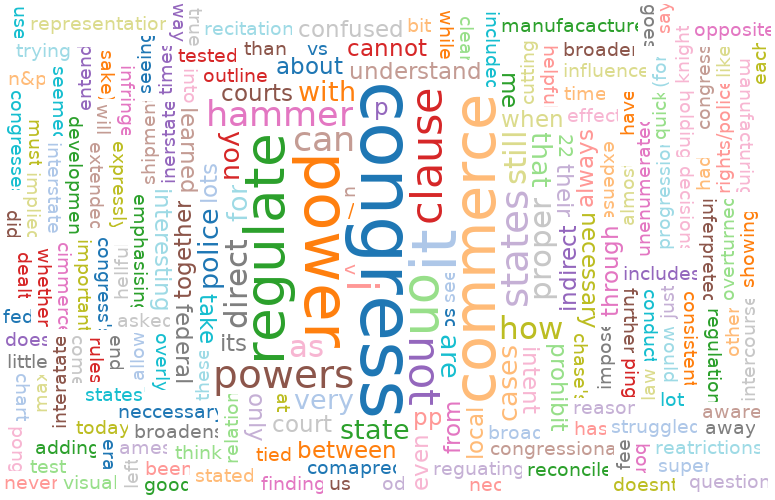The Volokh Conspiracy
Mostly law professors | Sometimes contrarian | Often libertarian | Always independent
The Key to Zoom University: More Polling, Less Lecturing
This semester I am lecturing less and asking far more polling questions.
In years past, I would usually start the class with a single multiple choice or true/false question. Students would enter their answers using the iClicker app. And after that initial question, I wouldn't touch the app again.
Now, with Zoom University, I am asking many more questions. In a 90 minute class, I may pose 6 or 7 poll questions. Each question takes about a minute to administer, and two-to-three minutes to review. I will often call on a few students before I disclose the correct answer. The iClicker app lets me instantly select the right answer, and students will know whether they got it right or wrong. And with a multiple choice question, students can see how many students selected each answer. If I sense that the class is evenly divided between two options, I can focus on those issues.
I am using more polling to keep students engaged. Zoom fatigue is real. And I try to combat that problem by making each student feel like they are in control of the class. Though polling has a drawback. In total, I may spend 20-25 minutes on polling. With more polling, I have less time to lecture and discuss cases. As the saying goes, talk less, poll more.
Fortunately, that sort of material can be reviewed outside of class. This process is known as the "flipped classroom." For Constitutional Law, I ask students to read the case summaries, and watch the videos, from An Introduction to Constitutional Law: 100 Supreme Court Cases Everyone Should Know. Students can also watch my YouTube lectures from last year when, in the time before COVID-19, I interacted with students IRL. This background serves as an effective substitute for the reduced lecturing.
I do not have that sort of resource for property--yet. I am also writing a new book, tentatively titled An Introduction to Property Law: 100 Property Cases and Concepts Everyone Should Know. That book, and the video library, should be public circa 2022. For now, my students can read the draft case summaries I wrote. This book will link up with several of the leading Property casebooks.
At the end of class, I use what is called a "minute poll." I give everyone one minute to write a short, one sentence description of the class. (Actually, iClicker limits answers to 140 characters--the length of old tweet). Students can also pose questions, or seek clarification. After class is over, I review every minute poll. If several students pose the same question, I will be sure to bring it up in the next class. So far, I have found this process helpful.
The software also generates a word cloud based on what the students wrote. Here are the word clouds for ConLaw and Property II:

 In some regards, I have found this sort of instruction more effective than in-person learning. I know, apostasy. But it's true. I teach a 9:00 a.m. class. Everyone is in class, on time, ready to go. No one walks in late, stressed after sitting in traffic for an hour, and looking for parking. I don't have to deal with the disruption of people leaving class to go to the bathroom. And, at least so far, the constant polling has given me instant feedback of which students are prepared and which students are not. Plus, in the past, students would usually leave campus right away to beat traffic. They seldom stuck around for office hours. And if students saw a long line outside the office, they would leave. Now, I routinely have an orderly queue after class, where I can meet with students for as long as I need. Some students meet in groups over Zoom office hours.
In some regards, I have found this sort of instruction more effective than in-person learning. I know, apostasy. But it's true. I teach a 9:00 a.m. class. Everyone is in class, on time, ready to go. No one walks in late, stressed after sitting in traffic for an hour, and looking for parking. I don't have to deal with the disruption of people leaving class to go to the bathroom. And, at least so far, the constant polling has given me instant feedback of which students are prepared and which students are not. Plus, in the past, students would usually leave campus right away to beat traffic. They seldom stuck around for office hours. And if students saw a long line outside the office, they would leave. Now, I routinely have an orderly queue after class, where I can meet with students for as long as I need. Some students meet in groups over Zoom office hours.
I used to think online instruction was vastly inferior to in-person instruction. My thinking on this question is shifting, class-by-class.
Editor's Note: We invite comments and request that they be civil and on-topic. We do not moderate or assume any responsibility for comments, which are owned by the readers who post them. Comments do not represent the views of Reason.com or Reason Foundation. We reserve the right to delete any comment for any reason at any time. Comments may only be edited within 5 minutes of posting. Report abuses.
Please to post comments


I give you lots of props for quizzing students lecture by lecture, monitoring their progress, seeing what they need work on, and I'm glad Zoom is making this easier and more efficient. The traditional (and laziest) approach is to be a Socratic asshole, not answer questions, and do no testing at all except for one monster essay exam at the end of the semester. The entire class could be totally at sea about the subject matter and the prof would never know it until it's too late. That that he would particularly care.
"Not" that he would particularly care. [I keep wishing for an edit feature]
Just be sure to include Goddard v. Winchell, 52 N.W. 1124 (Io. 1892), in your property top 100. It formed a very, very memorable basis for my second class on my first day of law school.
https://www.beldar.org/beldarblog/2003/10/method_to_the_s.html
Is this truly education, let alone a traditional law education?
Or is it Kindergarten?
I'd suggest the latter, and that the clicker is merely busywork to justify the presumption that students are learning.
It's hard to imagine much that would be inferior to in-person instruction at a law school so bad they tried (and failed) to steal the name of another law school, so I guess you have nowhere to go but up.
Yeah but it was Cougar High. So they were already up.
If I was a 18-22 year old paying 40K to stare at some guy talk at me on Zoom for 60 minutes 3 times a week I would demand my money back.
If you're the kind of person who thinks it's an attractive proposition to pay $35,000 a year to go to one of the worst law schools in the country, I doubt that having to go to school online is going to be the thing that pushes you over the edge.
Another way to look at this: one can get just as much from a Zoom lecture as a live one. And most experienced lawyers (like me) can lecture on typical law school topics, probably just as well. And the supplemental reading can be done quite as well online as with the books, in fact faster and more comprehensively.
Speaking as one who graduated in 1992, in the era of hardcover books and live (usually overly lengthy and boring) lectures and hours in the law library looking things up in Shepard's, Shepard's Preview, Shepard's Express, Words & Phrases, West's Digest, etc. . . well . . . you can get quite as good a law school education today for $0, or close to it. The only things I would miss would be all that sex in unlikely locations.
Captcrisis, I was with you, in total agreement, until that last line. All I remember from "unlikely location" Uni days were stolen kisses in the stacks. Different generation, no doubt.
Professor Blackman is moving with the times but not leaving his students behind. He seems to be giving all due diligence and care that they learn.
I was lucky. I got involved with the 3L who had lent me her couch during Intro Week. My next girlfriend was the assistant law librarian. They knew as much about the school as the architect who designed it. I suppose it was a different time though.
"They knew as much about the school as the architect who designed it."
Goodness, was it Walter Grope-ius? You must have a wonderful time and learned a lot in law school and surrounds!
"must have had"
AND . . . there was the time . . . I put a really obscene suggestion into my girlfriend's locker . . . And I said later, "Did you get it?" "What?" "The note I put into your locker, number 51!" "Um . . . my locker is number 52."
I appreciate both the original post and the comments above from captcrisis and mad_kalak. Innovation isn't easy: that Blackman is trying _something_ and offering reasonably good notes about each experiment should be useful to others. But mad_klak makes the same point (somebody) made in a barroom discussion the other day: some topics (particularly those with physical products) require in-person education and some topics require a level of interaction possible, but not easy, via current teleconferencing mechanisms. There ought to be a blog which focuses on innovation for those situations [and there may be... but I'm not aware of it].
You're just now figuring out active learning?
Jesus.
Inertia is very powerful.
https://en.wikipedia.org/wiki/Christopher_Columbus_Langdell
More is not always more. If more is discussed, that does not mean more is retained.
The real hope is that people actually retain what is taught.
Polls, where people get feedback on their own understanding helps do that. It turns it into a sort of game. Whether the person answers the question right or wrong, they are more likely to remember.
The "traditional" law school education format isn't the desirable for learning. The "socratic" lecture style might have been awesome for the smaller classes when Langdell was teaching, assuming it allowed students lots of opportunities to interact. But in large classrooms, it becomes extremely boring for students not participating. The case method also makes more sense if you read the entire case. But modern casebooks often end up with little squibs that have their context removed. That seems useless to me, since you can't really understand the law well without context. Better to summarize the law than assign squibs. Full cases (or nearly full cases) are also very good.
I believe online education will make law school more efficient. It will give students more opportunities to interact with the material, which in turn will help them retain it.